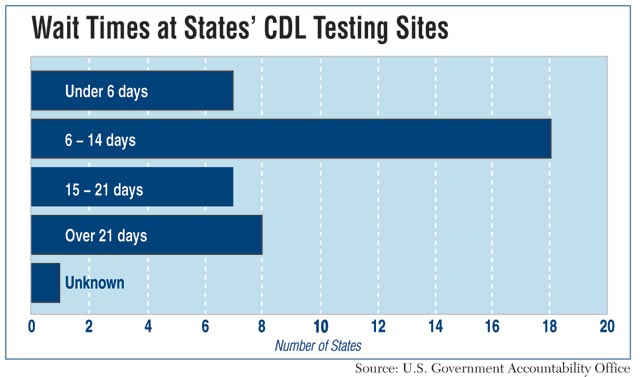Delays Growing for CDL Skills Testing; Industry Seeks More Data From States

Delays in scheduling skills tests for commercial driver licenses are growing, with some states reporting waiting times of up to eight weeks, and the problem isn’t likely to go away anytime soon, government and industry officials said.
Don Lefeve, CEO of the Commercial Vehicle Training Association, said testing delays remain “one of the most critical issues” facing training schools and trucking fleets as they try to ramp up hiring to meet the increasing demand for truck drivers.
Kevin Lewis, director of driver programs for the American Association of Motor Vehicle Administrators in Arlington, Virginia, said many states cut back on licensing staff during the recession and have been unable or unwilling to add personnel and test equipment since then because of funding constraints.
At the same time, new regulations promulgated by the Federal Motor Carrier Safety Administration have increased CDL testing requirements.
FMCSA’s new rules, which took effect in July, “caught a lot of people by surprise,” Lewis said in an interview last week with Transport Topics.
Among the changes is a requirement that states test CDL applicants for knowledge of pre-trip inspections and they perform additional maneuvers, such as parallel parking, as part of the skills test. States also must provide additional oversight of examiners to detect fraud and use new Web-based data programs to share test information and scheduling with licensing officials in other states.
“The requirements for testing became more finite,” Lewis said. “Now there is a floor, a minimum number of things that must be done. Many states were beneath that floor and, although I would say most states are now in compliance, it’s not 100%.”
Because the tests are more comprehensive, they also take longer to complete, Lewis added.
“A test takes about an hour and a half, so you can do only four or five tests in a day,” he said.
Another factor in delays, Lewis said, is that more applicants, especially those coming from so-called CDL mills that offer weeklong quick training programs, are unable to pass the expanded skills tests and must wait to be retested.
CVTA’s Lefeve said he hopes that a provision can be inserted into a highway funding bill that would force states to document waiting times and explain what they are doing to mitigate delays.
“Our intent is to spotlight the issue,” he said. “Without this information, it’s hard to know if it is a resource issue or something else.”
Lefeve said that FMCSA would collect the data annually and could withhold federal funds from states that fail to take steps to adequately reduce testing delays.
A survey conducted by the U.S. General Accountability Office in February and April 2015 found the waiting times for CDL skills testing at state testing facilities in eight states were more than 21 days, with waiting times of 15 to 21 days in seven states and six to 14 days in 18 states. The wait times reported in seven states were less than six days.
Delays were substantially shorter in 39 states that permit the use of third-party testing, GAO reported, with waiting times of 15 to 21 days in just two states, 6 to 14 days in four states and less than six days in 20 states.
Joseph Morrissey, a spokesman for the Department of Motor Vehicles in New York, where school officials say applicants face some of the longest delays, said, “We are working hard to both implement FMCSA mandates regarding CDL permit issuance and license testing while minimizing any negative customer impacts.”
In Florida, a representative of the Department of Highway Safety and Motor Vehicles, said the state is not experiencing delays for CDL testing, in part because companies, such as the Walt Disney World Resort in Orlando, are allowed to test their own drivers.
“Looking at our calendar today, we are not seeing a backlog,” Florida agency spokeswoman Alexis Bakofsky said.
In 2014, Florida issued a total of 164,070 CDLs, of which 36,539 were licenses issued to new drivers. The state has 186 testing sites and 382 qualified examiners.
Lefeve said it does not matter if states use third parties or state-run sites to test drivers, as long as sufficient resources are provided.
“Delays are getting worse right now because states lack the ability to stand up new facilities or hire new examiners,” Lefeve said.

